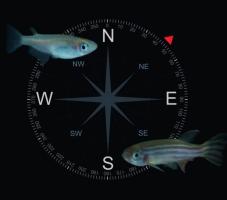 Six years ago, we posted about research that documented that when dogs defecate, they usually align their bodies along the magnetic north-south axis, not unlike the needle of a magnetic compass. It turns out that dogs are not unique in being able to sense the earth’s magnetic field and act like bio-compasses. Many animals, including humans, appear to be magnetoreceptive.
Six years ago, we posted about research that documented that when dogs defecate, they usually align their bodies along the magnetic north-south axis, not unlike the needle of a magnetic compass. It turns out that dogs are not unique in being able to sense the earth’s magnetic field and act like bio-compasses. Many animals, including humans, appear to be magnetoreceptive.
Scientists have documented that cows and deer graze and rest aligning themselves with magnetic north, all other factors being equal. (Wind and sun also affect the directions faced by cows, in particular.)
Lobsters, mole rats, and fruit flies are also believed to be able to navigate using magnetic fields. Some studies have also shown reactions in human brains when magnetic fields changed abruptly.
Whales also apparently are able to sense the earth’s magnetic field in order to navigate long-distance. Researchers have verified is that most magnetic field lines in the ocean run the same direction as the coastline. But in some places, these lines change direction abruptly and turn in a direction perpendicular to the coast. It has been observed that in these places it is very common to find beached whales. Magnetic abnormalities related to solar storms may also increase whale beachings.
Pigeon and monarch butterflies are also believed to be able to navigate using the earth’s magnetic fields. Luckily for them, beaching is not an issue, although tall buildings may be.
But how do animals and possibly humans sense magnetic fields? Is there some sort of bio-compass? Apparently, there is.
Recent studies have identified tiny clumps of protein that appear to align themselves with Earth’s geomagnetic field lines like a compass, and it’s thought that they can influence the nervous system to help animals navigate their surroundings.
“The nanoscale biocompass has the tendency to align itself along geomagnetic field lines and to obtain navigation cues from a geomagnetic field,” lead researcher Can Xie told Ian Sample at The Guardian. “We propose that any disturbance in this alignment may be captured by connected cellular machinery, which would channel information to the downstream neural system, forming the animal’s magnetic sense.”

Alas, GPS is killing our bio-compasses
GS: “Alas, GPS is killing our bio-compasses”
How so, GS? Any documentation of that?
GPS can’t be fully trusted!
Read and watch the news, idiots have driven into lakes and rivers using GPS.
PLUS: GPS devices rely upon receiving signals from at least four satellites. If they connect with only three, the positioning is not fully accurate. Problems can occur when obstacles, such as walls, buildings, skyscrapers and trees obstruct a signal. Extreme atmospheric conditions, such as geomagnetic storms, can also cause problems. In addition, the mapping technology which is used in conjunction with the GPS may not be up to date and cause navigational errors.
Phil:
Granted to your points. But each of those GPS failures has an non-GPS navigation failure analog. I’d hope that anyone using GPS as a primary method of navigation would have good, solid skills with dead reckoning, compass, map reading, etc., too. Printed mapping technology may well be out-of-date, too, and a little common sense can help: What sort of idiot trusts a GPS device to guide their car onto railroad tracks, for example?
My point is that GPS is a valuable technology for both seafarers and landfarers and to say that we’re losing our ability to navigate due to its introduction isn’t quite accurate. We may be losing our ability to navigate, but it’s due to laziness and stupidity, not the existence of the GPS.
GPS is a new tool and a good tool. That doesn’t mean that it completely replaces the “old ways”: it complements them… or should.